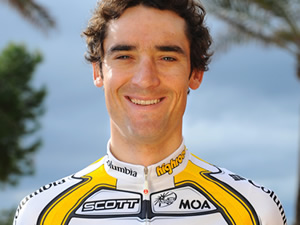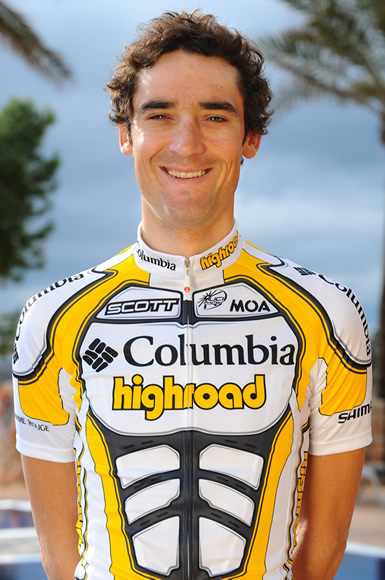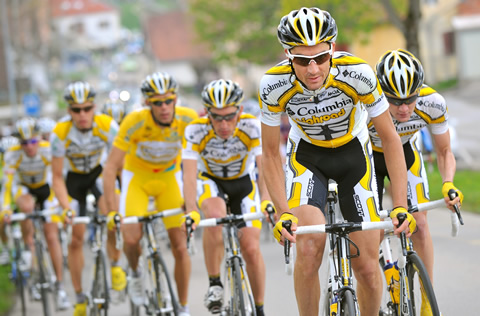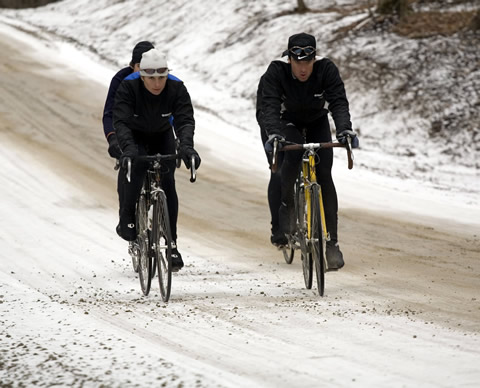
Michael Barry is a Canadian born cyclist who currently races for Team Columbia HTC. He is the author of "Inside the Postal Bus", which recounts his life on the road with US Postal in 2004, and he has written for AMD, Pedal Magazine, Velonews and the Toronto Star. Michael lives in Girona with his wife Dede and their two sons.
schmalz As an author and online diarist, you’re a rare breed in the peloton. Do you ever find yourself reflecting on moments in races thinking, "Hey this would make a good story"? Or have you ever been tempted to make a move in a race by the prospect of getting a good story out of the experience?
Barry I don’t plan out the moments, or attacks, or experiences to animate a story but I often see things during the race, whether in the peloton or the environment we are flying past, that I realize are unique and worth writing about. Most often, when on long rides alone in the mountains I can think about the sport, dissect it, and then build stories around those thoughts. To me, riding alone, somehow puts everything into perspective and clears my mind.
schmalz What’s your take on the level of discourse in the pro peloton? Are there a lot of literary types?
Barry There are a few but not a lot. Some of my teammates often surprise me with what they’re reading: Bernie Eisel always has a massive novel with him – usually one of the classics – and Pinotti is constantly reading ex phys books and political magazines while Burghardt can somehow lose himself in a novel while the bus bounces around on a tiny French road. Then, there are others that read car mags nonstop–in the bus, on the toilet, in bed. Sadly, I would guess there are a higher percentage of magazine reading/MTV watchers than book readers. Although, by the end of a Grand Tour we are mostly all gazing at the TV and paging through mags as racing for three weeks straight is certainly mind numbing on some level.
schmalz Do you ever find yourself in odd conversations with other riders during races when they find out you’re a writer? Are they afraid of you?
Barry I don’t think they’re afraid of me. I hope not, anyhow. Several riders have come up to me and said they read the Postal Bus book, or have read my online pieces, and enjoy them. During the Giro, many riders spoke to me about the Velonews pieces – it is nice to know they are not only read by the fans but also by my peers. Whenever I can, I try to encourage riders to write more often about their experiences as few people outside of our little bubble understand what racing is truly like. The media, often doesn’t even know what is happening in the peloton: What we see, how we feel etc. The television simplifies it all drastically – riding a mountain or lining up a field sprint looks simple and easy on TV. We have the opportunity to convey what happens, how we feel, and what we are thinking in those moments.
schmalz Have you ever had a rider that’s had issues with something you’ve written?
Barry No. My stories aren’t incredibly controversial so I haven’t any problems. Perhaps some riders haven’t liked something I have written but nobody has approached me about an issue.
schmalz You wrote a post for Velonews that was pretty critical of Garmin’s (which you said the Garmin riders may have later regretted – as they were probably working on team orders) chase of George Hincapie that kept him out of yellow, in fact you said, that if in George’s shoes, you’d feel betrayed. Is there a rivalry between the team managers at Garmin, Columbia and Astana – and what are the roots of this rivalry?
Barry Yes, there is a rivalry (not so much with Astana). The cycling media writes about it constantly. Oddly, the riders are all good friends and we spend a lot of time training together and socializing. I think the roots of the rivalry are based in jealousy–the fact that the two teams are American and they both end up fighting for attention, which in the end really isn’t beneficial to anybody and is damaging to the sport.
schmalz It’s odd that the riders all get on so well and then during races the fur flies, do you think it’s the idea of familiarity breeding (racing) contempt? Or is it that racers have to follows team orders? How do friendships change when you’re in races, does it ever get to the point where guys take things personally or do they know everyone’s just following orders?
Barry We are all innately competitive and even race each other on training rides – for fun and for practice. Maliciousness can change a friendship quickly and this usually happens when petty jealousies interfere with the racing. Riders also need to use their judgment in race situations as not every call from the director is the right one. Otherwise, we race like mad against each other day after day and can still enjoy a chat together in the evening.
schmalz How does a rider get around a "not-right" call from the team car?
Barry The director can’t see everything from the team car, and doesn’t know exactly what is going on in the race or how riders actually feel, so occasionally he will make mistakes. When he makes the wrong call over the radio, riders will talk to him on the radio, correct him, or go back to the car to chat and propose another plan. Often he will ask a rider to do something in the race and that rider might not be feeling great, or conversely can be feeling much better than expected, so his role will be changed based on how he feels. The DS can’t see this, or know it from the car.
schmalz How different do you think the races would be if the riders didn’t have radios or of the riders only had radios amongst themselves?
Barry The races would be far less predictable and more animated if radios weren’t used. Riders would use their instincts more instead of waiting for the DS to tell them what to do. The U23 Worlds in 2008 was a great example of how good racing is without radios–the race was exciting until the last meters. With radios, the races have become too formulaic as teams can control the variables There are many riders and teams that wouldn’t perform well without– in many cases the radios have become a crutch. The Tour was fairly tedious to watch this year as the racing was extremely controlled–a step towards getting away from that would be to rid the peloton of radios.
An argument is that they making the racing safer. They don’t and I would argue they make it more dangerous as they create a panic in the peloton when it isn’t announced there is a dangerous section of road, or whatever, ahead. Riders are now trained to react when they hear a command. So, when there is a dangerous descent, or a windy section coming up, there are 20 directors telling their riders to move to the front and suddenly there are 180 riders racing to the front right before reaching the hurdle in front of them. Inevitably more crashes occur.
I think it would be hard to control communication if only the riders were allowed them as there is nothing stopping someone in the car from cheating and using one as well.
schmalz I think you’re right, I also think the advent of race radios has taken away (or diminished) a valuable racing skill – the ability of a racer to read a race and to make a call on the road that will win or lose the race. These decisions have been transferred to the team car, where the directors can watch the TV coverage, get the time gaps, and tell the racers to react accordingly – the directors now want to make the decisions, and I think that’s why you have so many directors that are adamantly opposed to the ban on race radios – it makes their role less important. They can’t say that they made the race winning call from the car. How much info does your team get from the car? For instance, when you are chasing down a break for a sprint for Cavendish, is your director telling you specifically how fast to ride, how much the time gap is, etc.?
Barry Over the radios we receive information on what is going on ahead: The time gap, how many riders are in the break, if they are working together well, etc. The DS will tell us who on the team should be riding on the front in pursuit of the breakaway and how fast we need to go to catch them. He will also relay information about the finish –the technical aspects of the course – as well as what the weather is like up ahead so we can prepare for wind or rain.
schmalz So what is it like to be in the Cavendish delivery train?
Barry We have confidence in him and he has confidence in us, which is the essence of making the whole thing work and run smoothly. We have also learned from our errors and have figured out a formula that will deliver him nicely. Being in the lead-out is an emotional buzz that leaves a lasting memory when it is executed properly. Like a TTT, when the team is flying, there are few better moments in cycling. Everybody is committed, devoted and rides selflessly towards a goal. To me, that sacrifice, is unique and in some ways, what cycling is all about.
schmalz So what are the specifics of that sort of effort? When you get to the front, how far from the line are you? Are you the 10k to 5k guy? And if you have a power meter on your bike, what kind of wattages are you putting out? And for how long? And yes, I am getting waaaay too specific…
Barry It really depends on the race: Who we have on the roster, what the course is like and how strong the peloton is. For example, in Ireland last year I was often the last guy to swing off with 200m to go while at the Giro this year I spent most of the day riding on the front to reel the breakaway in and then the other guys did the final few kilometers of the leadout. The efforts were entirely different. Over the last kilometers hundred meters we are almost sprinting at 700-1200 watts whereas I ride at anywhere from 200-400 watts (depending on the terrain) while riding at a steady tempo on the front for a hundred, or so, kilometers. We gauge our efforts based on the course difficulty and the level of the other teams. If other teams can threaten us, we increase our speed to keep Mark in position.
schmalz I have a question about how you pull off after doing a lead out, especially in the case of pulling off with 200 meters to go. How do you keep from getting killed? Or do you pull in a way that will help Mark strategically? Do you try to disrupt the other team’s rhythm or do you just try to get the hell out of the way?
And you saying that you will ride for 200-400 watts for 100 or so K just made my heart hurt.
Barry We try to get out of the way of the sprint as quickly as possible. Pulling off is certainly a bit sketchy as our speed decreases immediately, as we are full of lactic acid, and there are 100 guys racing towards the line right behind us. So, essentially, to save our own skin and in respect for the others, we get out of the way as quickly as possible. Interfering in the sprint after pulling off is also frowned upon as it impedes the sprint, is dangerous and is poor sportsmanship.
schmalz We hear a lot about unwritten rules like: no attacking in the feed zone or while the yellow jersey is taking a leak, but what’s the unwritten rule that most cycling fans don’t know about?
Barry Hmmm. When peeing off the bike don’t pee too close to the peloton, or at the front of it (amazingly, some riders try to pee off their bikes in the middle of the peloton which always draws yells as the pee sprays into the bunch). There are dozens of these unwritten rules. More of less, most rules just come down to being respectful of each other – simple manners.
schmalz Yeah, I imagine there’s a lot of concern about "splash" avoidance. Getting whizzed on is never fun. If you’re going into a race with the goal of leading out for Cav, how do you prepare for that, if at all? Do you do sprint workouts?
Barry During our team training camps we did sprint workouts and leadouts. At home, I sprint against my training partners or lead them out and often just race myself to a town sign, a rock or whatever is at the roadside.
schmalz Do the rocks ever win?
Barry Yep
schmalz I know how that feels, stupid rocks. You did the Giro this year, what specifically did you do (if anything) to prepare for that race? Are you a tech guy when it comes to training or are you a "feel" guy?
Barry I did a lot of racing prior to the Giro so I didn’t have much time at home to do any specific training. Over the years I have learned that I need a training program, from a coach, but that I also need to recognize the way I feel in the morning and on the bike. If I feel good I may ride longer, or harder, and if I feel lousy I will taper the training session or stay in bed. When I don’t have to do specific, structured training I simply love riding my bike in the mountains, on dirt roads, for hours. 
schmalz Professional athletes find themselves in a very strange position (in relation to the "regular" working world), in that they have to retire at an age where most people are just getting their careers moving in the direction they want them to go. Does the thought of retirement from being a professional cyclist seem daunting to you?
Barry It scares me and it excites me. Seeing how my wife, who was a professional cyclist, and some friends who were also pros, have transitioned inspires me. The possibility of doing something else, or dozens of other things, intrigues me and excites me. But, I also know I need to figure out exactly where I will fit in and what I will do. Cycling takes up most of the cyclist’s life as we spend over 200 days a year away from home, which is unlike many other jobs or sports, so the transition is especially hard. But, that said, cycling has also given me many assets I know will help me in my future pursuits.
schmalz Do you think the nature of professional sports – i.e., the idea that a career is temporary – may tempt some professional athletes to engage in dodgy behavior like using performance enhancing drugs or other shortcuts to get an edge; because if they get caught, all they have to do is retire?
Barry No. Sports is a reflection of society. People cheat: On school exams, in business, on their taxes etc. When the controls are tighter fewer people get caught as fewer are willing to take risks which is why the IRS does audits, exams take place in classrooms with a teacher present, businesses are monitored, and police control cars’ speeds with radars. With increased doping controls fewer riders are doping and cycling is becoming cleaner.
schmalz Do you think the doping controls currently used in cycling are good enough to catch racers that "cheat on their taxes"?
Barry The controls are clearly getting much better. Riders are getting caught which is a good sign as targeted testing is far more effective.
schmalz How tired are you of answering the doping questions?
Barry They come up in nearly every interview I do. It is sad that our sport is so associated with doping but it is the reality that was created and it is now our job to change the public’s impression by racing clean.
schmalz Wow – this interview has been surprisingly somber, I feel that I should mention my rear end to balance things out here. There – that felt better. Now, perhaps we should end on a lighter note. It seems that almost everyone has a story about racing with the inimitable Salvatore "Toto" Commesso (who I admit to being a bit [or a lot] obsessed with) – did you ever race with him, and if so, what do you remember about him?
Barry Well, you’re asking somber questions.
Commesso. Yes!! I raced with him many many times. One of the first times we raced together was at the U23 Worlds in Lugano in 96. He was in a breakaway for most of the race and then his 4 Italian teammates sped off and took the top 4 spots. I was in a small group behind which caught him and which I then attacked out of for 8th. As I attacked he yelled something in Italian–I didn’t look back but pushed on to the finish. That is my first memory of him. My second, is of him hitting on my wife at the USPRO Champs in Philly a few years later. My third is of him being ‘pantsed’ by my Saturn teammate Brian Walton later that week in Philly. My fourth is of….
There are too many memories after that. Toto was a pudgy little fella. Last I saw him–at one of the early season Italian races – he was racing for some dodgy Italian team and was pudgier than ever.
schmalz Rumor has it – or at least the New York Times says that you read Toto pretty consistently – are we pretty accurate or way off base? And we have to come up with something for Cavendish – anything you care to share about Mark (thus alienating him forever)?
Barry I enjoy reading Toto as it captures the true personalities in the peloton, which is of course what makes it humorous. Cav? His speed and his mouth are obvious. His dancing skills might not be so obvious – and he is quite a dancer, as his mom taught dance. He can certainly move around a hotel room to whatever is on MTV very well.

Greetings from Great White North. Good interview, a tad too somber.
Another fun interview to read. I like Barry and the perspective he brings to readers from the peloton. Good stuff, keep it coming.
ask him about chinese medicine???
awesome interview! I’ll have to check out his writings… no links to anything?
The velonews link is active in the article, you can get his other stuff there.
http://tour-de-france.velonews.com/author/84328
Toto taught Neil Strauss everything he knows.
Thanks for the link! Very interesting stuff.
not nycity standard
bored
not ask him why he was on dr blacks list?
If you are looking for a really bad read, and kisses Lancer’s ass… read “Inside the Postal Bus”.
He needs to put some teeth in his writings.
“My second, is of him hitting on my wife at the USPRO Champs in Philly a few years later. My third is of him being ‘pantsed’ by my Saturn teammate Brian Walton later that week in Philly.”
Wh– what the f!
The door was wide open, Dan. Wide open. Sheesh.
Of course you can’t expect Michael to be controversial in his writing while he is still part of the pro peleton! It’s his living and he can’t afford to be ostracized or – worse – attacked. Imagine what Paul Kimmage would have had to endure if “A Rough Ride” had been published while he was still competing in Europe.
Perhaps we can expect more incisive and controversial material from Barry once he has retired. Mind you, his gentle nature and genuine concern for his fellow athletes may well stop him from telling it “like it is”, even then.
Just read Barry’s VN blog on the tour and his whole favors/non-favors bit on what happened when Hincapie didn’t get his gifted yellow jersey. I guess that means he won’t sign with “The Shack” LOL!
Especially liked the insights into the Cav/leadouts and life in the races. Cool guy – glad he could do it. Thanks Schmalz for bringing it on.
seems like a nice guy, but ‘postal’ absolutely sucked. one of my least favorite books ever. this was a billion times more interesting and informative than that.
When I say bad read, I mean he needs a editor to clean up the direction of the book. Verses long boring ramblings that struggle to make a page count.